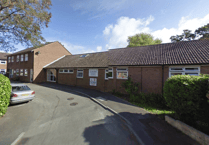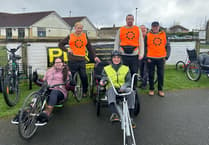After many years of bringing new life into the community, from April this year, Paulton Hospital will no longer be delivering babies as part of Clinical Commissioning Group proposals for the area. The postnatal beds will also be removed as part of the plans, with a new pilot hub in its place, from April, offering a one stop shop of antenatal and postnatal services, but no overnight stays.
The joint Governing Bodies of Bath and North East Somerset, Swindon and Wiltshire Clinical Commissioning Groups (BSW CCGs) unanimously voted through the proposals at a meeting held at Dorothy House, Winsley, on Thursday this week, with members of the public gathering to hear the decision. There has been great sadness in the community since, with many of you getting in touch to let us know your maternity experiences with the hospital over the years.
Cllr Grant Johnson, who started a petition last year to save the maternity beds at Paulton, (which has seen a revival since the decision was made, reaching nearly five thousand signatures at the time of writing), has said he is “devastated” at the decision. Both he and fellow B&NES Councillor for Paulton, Liz Hardman, say they will be approaching local MP, Jacob Rees-Mogg.
He said: “What a bad day for Paulton, and an even worse day for rural services in B&NES and Wiltshire. Once again, we see the somewhat inevitable centralisation of services that has long been the cancer of our rural communities. The slow deterioration of what people value and hold close to their hearts, vanished at the blink of an eye.
“The overriding theme of this whole process has been that of care. Care for the Mother, care for the child and care for the family that supports them. Yet, there seems to be a complete lack of understanding for the care that needs to be given to a community.
“I feel the weight of that community as a Councillor, as a son of Paulton, and as an uncle to the last of my family to be born here. The feeling of sadness, anger and shock is shared by the majority of us Paultonians.
“It’s often said that you don’t know what you’ve got until it’s gone, but I think everyone in Paulton knew exactly what they had. I’ve been overwhelmed by the level of passion and support since starting this campaign back in November 2018 and I’m truly devastated at this decision.”
The meeting heard that the proposals had not been about saving money, about buildings, or a lack of staff, but about using resources more efficiently - it was pointed out that Paulton had only had six babies born throughout December, and that mothers were “voting with their feet” - choosing to have their babies at the RUH.
The proposals will see the Freestanding Midwifery Units (FMUs) at Paulton and Trowbridge close, with two new Alongside Midwifery Units (AMUs), built at the RUH and Salisbury, with the RUH’s new building expected to open in 2023. A fundraising campaign for this is ready to go with the Forever Friends Appeal, called ‘Space to Grow’, which will need to raise around £6 million for the new build. In the meantime, mothers who were due to give birth at Paulton in April and beyond will be supported to make decisions - including giving birth at the FMU in Frome. Any mums expecting to give birth at Paulton from April onwards are asked to get in touch with a midwife to discuss their options.
The new AMU at the RUH will mean that women will be able to have a midwife-led delivery in a purpose-built environment, and if complications should arise, would receive medical treatment just next door. It has been stated that one of the reasons Paulton was underused was because mothers were afraid of being moved during labour if they needed medical assistance, choosing the RUH instead.
The Journal spoke to the Director for Service Delivery, Lucy Baker, after the meeting. Asked if more could have been done to encourage mothers to birth at Paulton, she said: “In the last two years, we’ve done a huge amount of work in the Paulton area to really emphasise this offer of choice. We’ve made appointments where women can go and see the facility - we’ve done a lot of work in that area, and yet mums are still not choosing to use it.
“When we’ve spoken to those mums, it was really down to the fear of transfer during labour.
“The other thing that has changed from that generational use of Paulton is that our mums are very different from how they used to be - they are now more complex; they are older, weigh more, or have other co-morbidities, which means that some of our mums can’t have a safe birth in some of our Freestanding Midwifery Units, but could have a mid-wife led birth in an Alongside Midwifery Unit.
“We really understand and appreciate that sadness within the community and this is not a decision we’ve made lightly; we have spent three years really thinking this through, looking at the clinical case for change, but most importantly, talking and listening to people about what they want.”
62% of respondents to the consultation on the proposals strongly disagreed or disagreed with stopping supporting births at Paulton and Trowbridge and 59% disagreed to replace the post-natal beds with support closer to, or at home. 51% disagreed that closing beds would enable resources to be used more efficiently.
The day before the meeting, the Royal College of Midwives’ Bath branch released a statement which acknowledged the need for a more efficient service, but questioned going against the consultation when statistics showed people disagreed so strongly. They called for an interim period, where births would still continue at Paulton and Trowbridge, to allay concerns, saying: “In addition to the concerns raised via the consultation, it is unclear why this element of the transformation plan is recommended to go ahead, prior to further development of plans to provide a new AMU for women at low risk of complication in Bath. The FMUs were seen as calm and special places that supported birth in the local community across family generations.”
Responding to criticism over strong statistics and proceeding with the proposals despite this feedback, which was independently analysed by the University of Bath, Ms Baker said: “In terms of statistics, it is really interesting how they are used. If you look at the number of people who actually answered that question, there was either a missing answer or they didn’t give us a preference about whether they agreed or disagreed - it’s actually 59% of people who strongly disagreed or disagreed with reducing from four to two [FMUs] and 40% of people did agree.
“We recognise that that still demonstrates a strong sense of feeling from the local community, but we have to weigh that against the efficient use of our resources.
“I think the other thing we have listened to is the stronger response around the post natal beds. There is a real sense of fondness for those beds, and an emotional attachment to them, and we really did listen to that.
“We are keeping four of those beds [Editor: not at Paulton, but Chippenham] for a further twelve months to give us time to work with mums and families to give us time to look at what that postnatal pathway will look like in the future. We appreciate and completely understand the concerns, particularly in Paulton, that those beds are going, and birth episodes won’t be happening there. However, it is important to remember that all of mums’ postnatal and antenatal care will still happen in Paulton.”
This will take the form of a new hub, which will be a pilot scheme (initially, before settling into a permanent service), so that the offering can be amended to best fit the needs of local families. There will be support for both antenatal and postnatal services, and local people are being encouraged to play an important role in identifying what the new service should look like. It is reported that Paulton Hospital’s League of Friends has kept £60,000 aside for maternity renovations, waiting for the outcome of the plan.
“We will be getting out to Paulton in the very, very near future to hold some engagement events to really start very quickly that creation of the community hub pilot. We don’t want to design it for people, we want people to design it.
“We then want to look at how we can improve that environment, to make it fit the new service. Before April, there will be some ‘at pace’ work on designing what the community hub is. The pilot will then go live from April, and we will continuously monitor the impact of that pilot; we want to hear from mums, families and staff about what they think about it and what changes they would like to make, because nothing is fixed; so we can keep changing things until we get it right. So, there’s a really exciting opportunity to design a brand new service that will not only meet the needs of local mums and families, but will also help deliver the Better Birth recommendations.
“We are really keen that we use the pilot methodology for these community hubs so that we get the location right and the service right for those people. The service in Paulton will be different to the service in Trowbridge, so I would expect the pilot phase to last for at least six months, but then that would be the commitment, that would be the service. Once we get the pilot running, that will be the way we run it, so there won’t be another process to go through.
“We understand the sadness and that this is the end of a generational period at the hospital; again, it’s not a decision we’ve taken lightly. I do think this is a really exciting time for the local community to get involved, and help us get it right in terms of that community hub model going forward.”
The new hub could see closer working between midwife staff and GPs, prescriptions on site, perinatal and infant mental health care, breastfeeding support, health visiting and even services such as toy and sling libraries and debt management advice.
“It will be a massive piece of engagement, and we would love to hear from mums and families that want to be involved. We will be planning some sessions in the local area to talk to people - not about this decision, but about how we move forward and what those services will look like, and we are looking to get out to the local community as soon as possible.”
If you will be affected by any of these services changing, or for more information, visit: www.transformingmaternity.org.uk. This will include proposed timeframes for changes.To get involved in the next phase of co-producing services, including designing the services for Paulton’s new hub, email: [email protected]




